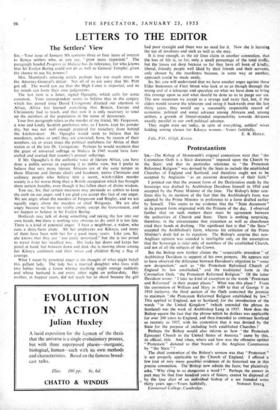LETTERS TO THE EDITOR
The Settlers' View
Snt,—Your issue of January 9th contains three or four items of interest to Kenya settlers who, as you say, "grow more impatient." The paragraph headed Progress in Malaya has its relevance, for who,kqows that Sir Evelyn Baring could not do as well as General Templer, given the chance to use his powers ?
Mrs. Mumford's amusing article perhaps lays too much stress on the Attorney-General's defeat. Not all of us are sorry that Mr. Pritt got off. The world can see that the High Court is impartial, and its lay minds can form their own judgements.
The last item is a letter, signed Oguagha, which calls for some comment. Your correspondent seems to believe that in the century which has passed since David Livingstone directed our attention to Africa, Africa has learned everything that Britain, Europe and Christianity had to teach, and that now it is only necessary to total up the numbers of the population in the name of democracy.
Your first paragraph refers to the murder of my friend, Mr. Fergusson, a wise and kindly Scottish gentleman who, as I know, kept his powder dry, but was not well enough prepared for treachery from behind the kitchen•door. Mr. Oguagha would seem to ,believe that his murderers, unless or until they are convicted, have, by reason of their numbers, six or seven times the political usefulness for Africa of their victim or of the late Dr. Livingstone. Perhaps he would maintain that the grant of universal suffrage in Malaya in 1945 would have fore- stalled and averted that country's present sufferings.
If Mr. Oguagha's is the authentic voice of literate Africa, you have done a public service in exposing it to public view, but I prefer to believe that very many literate Africans are Of the same temper as those illiterate and literate chiefs and headmen, native Christians and ordinary people who believe that a secret, witch-ridden murder society is a far worse thing than a British occupation which has brought them certain benefits, even though it has fallen short of divine wisdom.
You say, Sir, that certain measures may persuade us settlers to keep the curb on our anger, and I am glad you accept this fact of our anger. We are angry about the murders of Fergusson and Bingley, and we are equally angry about the murders of chief Waiganjo. We are also angry because we have no visible enemy except the Government, and we happen to believe in Sir Evelyn Baring.
Hotheads may talk of doing something and taking the law into our own hands, but-there is nothing very obvious to do, until it is too late. There is a kind of potential anger. I have a neighbour, a widow, who runs a dairy-farm alone. All her employees are Kikuyu, and many of them have been with her for a good many years. Like you, Sir, she knows that they are "too easily terrorised," but she is too proud to waver frdm her steadfast way. She locks her doors and keeps her pistol at hand, but between *dawn and dusk she is moving about among her Kikuyu cattlemen and their wives and children flying a flag of courage.
What I mean by potential anger is the thought of what might befall this gallant lady. The lady has a married daughter who lives with two babies beside a forest Whence anything might emerge suddenly and whose husband is out every other night on police-duty. Her mother, in happier years, did not teach her to shoot because the girl had poor eyesight and there was no need for it. Now she is learning the use of revolvers and such as well as she may.
It is true enough, as the air lines claim in another connection, that the loss of life is, so far, only .a small percentage of the total traffic, but the losses cut deep because so far they have all been of kindly, liberal, friendly people well liked by their friends and their servants, only chosen by the murderers because, in some way or another, approach could be made easily.
So, Sir, you will understand that we have another anger against those Elder Statesmen of Fleet Street who look at us as'though through the wrong end of a telescope and speculate on what we have done to bring this revenge upon us and what should be done to us to purge our sin. The new statesmen we accept as a strange and nasty fact, but, if the elders would reverse the telescope and swing it backwards over the last, thirty years, they would see a reasonably respectable record of economic, political and social advance among Africans and, among settlers, a growth of liberal-minded responsibility towards Africans exactly parallel to our owA'political advance.
They might even see today, in spite of everything, settlers' wives holding sewing classes for Kikuyu women.—Yours faithfully, Pala, P.O., Gilgil, Kenya..
E. B. HOYLE.


































 Previous page
Previous page